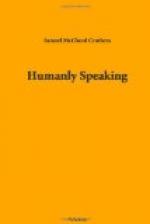Scholarly research among ancient manuscripts is the cause of destructive criticism. The scholar with the most peaceable intentions in the world disturbs some one’s faith. His discovery perhaps involves the reconstruction of a whole system of philosophy.
A law is passed. The people are pleased with it, and then forget all about it. But by and by a conscientious executive comes into office who thinks it his duty to enforce the law. Such accidents are liable to happen in the most good-humored democracy. When he tries to enforce it there is a burst of angry surprise. He is treated as a revolutionist who is attacking the established order. And yet to the moderately philosophic observer the making of the law and its enforcement belong to the same process. The difficulty is that though united logically they are often widely separated chronologically.
The adjustment to a new theory involves changes in practice. But the practical man who has usually little interest in new theories is surprised and angry when the changes come. He looks upon them as arbitrary interferences with his rights.
Even when it is admitted that when considered in a large way the change is for the better, the question arises, Who is to pay for it? The discussion on this point is bound to be acrimonious, as we are not saints and nobody wants to pay more than his share of the costs of progress. Even the price of liberty is something which we grumble over.
You have noticed how it is when a new boulevard is laid in any part of the city. There is always a dispute between the municipality and the abutters. Should the abutters be assessed for betterments or should they sue for damages? Usually both actions are instituted. The cost of such litigation should be included in the price which the community pays for the improvement.
If people always knew what was good for them and acted accordingly, this would be a very different world, though not nearly so interesting. But we do not know what is good for us till we try; and human life is spent in a series of experiments. The experiments are costly, but there is no other way of getting results. All that we can say to a person who refuses to interest himself in these experiments, or who looks upon all experiments as futile which do not turn out as he wished, is that his attitude is childish. The great commandment to the worker or thinker is,—Thou shalt not sulk.
* * * * *
Sulking is no more admirable in those of great reputation than it is in the nursery. Thackeray declared that, in his opinion, “love is a higher intellectual exercise than hate.” And looked at as an exercise of mental power courage must always be greater than the most highly intellectualized form of fear or despair.
I cannot take with perfect seriousness Matthew Arnold’s oft-quoted lines:—
“Achilles ponders in his tent,
The kings of modern thought are dumb.
Silent they are, though not content,
And wait to see the future come.
They have the grief men had of yore,
But they contend and cry no more.”




